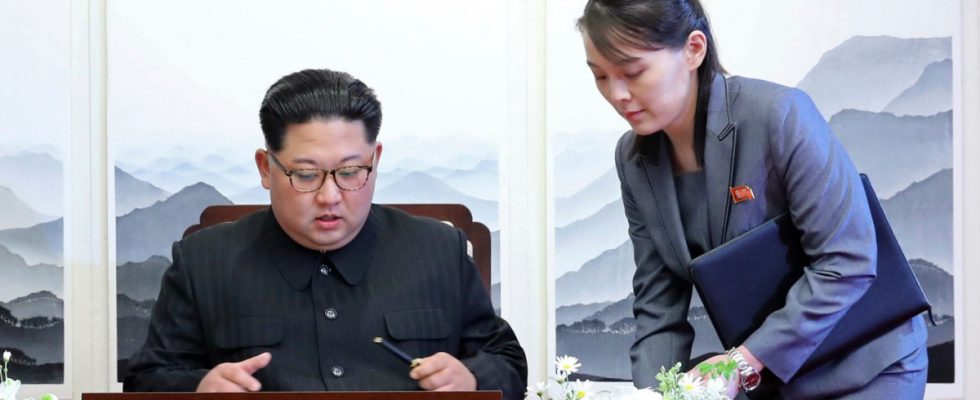On Monday, North Korea’s regime once again talked about Japan. A statement from Kim Yo-jong, the sister and propaganda representative of North Korean leader Kim Jong-un, appeared in the state media of the party dictatorship. It said: “Recently, through another channel, Kishida expressed his intention to meet the President of the DPRK in person as soon as possible.” Fumio Kishida is the Prime Minister of Japan. DPRK is short for Democratic People’s Republic of Korea, North Korea’s official name. And by “President of the DPRK” we mean Kim Jong-un. It remained unclear what channel Kishida wanted to use to organize a meeting with Kim. But Kim Yo-jong didn’t care. In any case, she only reported the spectacular attempt at initiation in order to reject it.
The statement literally said: “If Japan continues to try to interfere in the exercise of our sovereign rights and deepen the kidnapping matter, the Prime Minister will achieve nothing but a reputation that the initiative is only concerned with his own popularity.”
Kishida wants to talk about the Japanese that North Korea once kidnapped
This is the story of a summit that will probably never take place. It’s been going on for a while, because it’s true: As a statesman who wants to impress his electorate with a decisive foreign policy, Fumio Kishida has repeatedly said that he wanted to meet Kim Jong-un. Kishida repeated this on Monday. Shortly after the report from North Korea emerged in Tokyo, he said loudly Japan Times in an upper house committee: “I have addressed North Korea directly several times because I believe that high-level discussions are important to resolve issues such as the abduction problem.”
So it’s also true that Kishida wants to talk to Kim Jong-un about what Kim Yo-jong disparagingly calls “the kidnapping thing.” It’s about the kidnappings of Japanese citizens to North Korea in the 1970s and 1980s. Japan officially counts 17 people whom Pyongyang is said to have kidnapped to North Korea, among other things, to teach Japanese language and culture at spy schools.
The relationship between Japan and North Korea is complicated. The two countries do not have diplomatic relations. For North Korea, Japan is a vassal state of the USA. For Japan, North Korea with its nuclear weapons is a danger. But they also share an eventful history. Between 1910 and 1945, Japan occupied all of Korea, including North Korea. Around 25,000 people live in Japan whose families came to Japan back then and who today expressly support the regime in Pyongyang.
There was a peak in 2002. For North Korea, the issue was settled
And then there is the “kidnapping problem,” a Japanese national grief that continues to burden the victims’ families to this day. There was a summit in Pyongyang in 2002. Japan’s then Prime Minister Junichiro Koizumi met Kim Jong-il, Kim Jong-un’s father. Kim Jong-il apologized. However, North Korea only admitted to 15 kidnappings and only allowed five victims to return because the others had died. Since then, the issue has been settled for North Korea. But not for Japan.
Recently the relationship seemed to improve – but the interests simply don’t match. When Kishida promised an unconditional dialogue with Kim Jong-un, his main concern was the kidnapping issue. North Korea’s regime, on the other hand, sees a Japanese connection as an opportunity to break up its enemies’ alliance. Because of Pyongyang’s arms buildup, the United States, South Korea and Japan will be closer than ever in 2023. Kim Jong-un can’t like that.
In any case, he treated Japan much more nicely at times than he did with South Korea and the USA. After the severe earthquake on New Year’s Day on the Noto Peninsula, Kim sent an unusually friendly letter of condolence. “He referred to Kishida as ‘Your Excellency,'” Thae Yong-ho said in amazement in the magazine afterwards The Diplomat. Formerly a diplomat for North Korea, Thae defected to South Korea in 2016 and now sits in parliament there for the conservative People Power Party. Thae knows how North Korea weighs its words. He concluded: “Pyongyang sees Japan as the weakest link in the trilateral pact.”
North Korea doesn’t even want to let Japan’s footballers into Pyongyang these days
But by mid-February the prospect of a Kim/Kishida summit had essentially disappeared. Because Kim Yo-jong commented on Kishida via the state news agency KCNA. He had previously said again that he wanted to meet Kim Jong-un. Kim Yo-jong said: From her perspective, there is no reason not to view Kishida’s speech positively – “as long as it was driven by the intention to courageously free herself from the shackles of the past.” But that’s exactly what Kishida can’t and doesn’t want to do. The kidnapping problem is too important to Japan for that.
With Kim Yo-jong’s latest statement, the summit may finally be off the table. North Korea doesn’t even want to let Japan’s footballers into Pyongyang these days. On Thursday, the teams from both countries played against each other in Tokyo as part of qualification for the 2026 World Cup. Japan won 1-0. The second leg should have taken place this Tuesday. 14 government officials from Japan were to accompany the team.
But then North Korea told the Asian Football Association that the game could not take place in Pyongyang due to “unavoidable circumstances.” North Korea’s Workers’ Party Newspaper Rodong Sinmun had previously reported a “virulent infectious disease” in Japan. In fact, Japan’s Institute of Infectious Diseases is reporting an increasing number of streptococcal infections. A replacement venue could not be found so quickly. FIFA, the world football governing body, has referred the case to its disciplinary committee. And the diplomatic ice age between Japan and North Korea continues for now.

